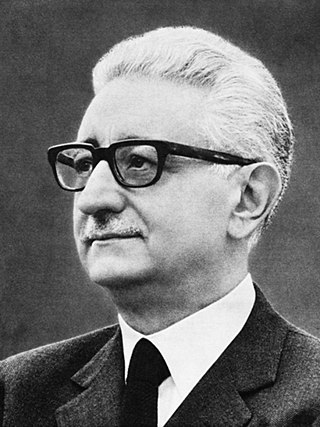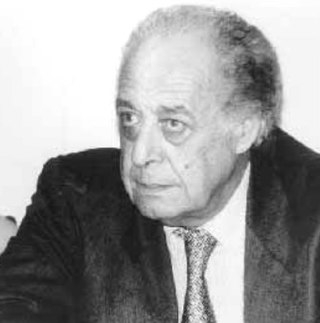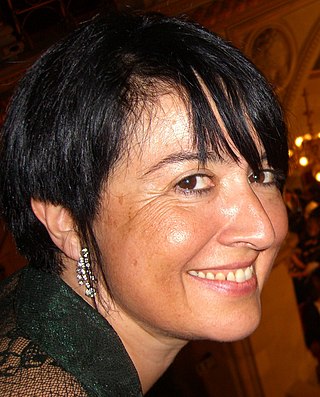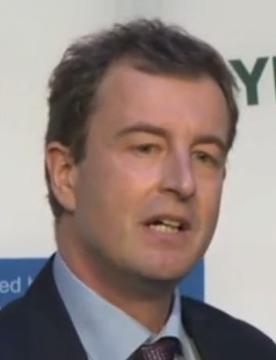Related Research Articles

Enrico Berlinguer was an Italian politician, considered the most popular leader of the Italian Communist Party (PCI), which he led as the national secretary from 1972 until his death during a tense period in Italy's history, marked by the Years of Lead and social conflicts, such as the Hot Autumn of 1969–1970.

Nicola Abbagnano was an Italian existential philosopher.
John Coprario, also known as Giovanni Coprario or Coperario, was an English composer and viol player.

Palmiro Michele Nicola Togliatti was an Italian politician and leader of Italy's Communist party from 1927 until his death. He was nicknamed Il Migliore by his supporters. In 1930, he became a citizen of the Soviet Union, and later he had a city in that country named after him: Tolyatti.

Giovanni Leone was an Italian politician, jurist and university professor. A founding member of the Christian Democracy (DC), Leone served as the President of Italy from December 1971 until June 1978. He also briefly served as Prime Minister of Italy from June to December 1963 and again from June to December 1968. He was also the president of the Chamber of Deputies from May 1955 until June 1963.

Lucio Colletti was an Italian Western Marxist philosopher. Colletti started to be known outside Italy because of a long interview with him that Marxist historian Perry Anderson published in the New Left Review in 1974.

The Italian Democratic Socialist Party, also known as Italian Social Democratic Party, was a social-democratic political party in Italy. The longest serving partner in government for Christian Democracy, the PSDI was an important force in Italian politics, before the 1990s decline in votes and members. The party's founder and longstanding leader was Giuseppe Saragat, who served as President of the Italian Republic from 1964 to 1971. Compared to the like-minded Italian Socialist Party on the centre-left, it was more centrist but identified with the centre-left.
Galvano Della Volpe was an Italian professor of philosophy and Marxist theorist.

Gianfranco Pasquino is an Italian political scientist. Professor Emeritus of Political Science at the University of Bologna and Senior Adjunct Professor at SAIS-Europe (Bologna). He studied at the University of Turin under Norberto Bobbio and specialized under Giovanni Sartori at the University of Florence. In his professional life, he has been associated with the University of Florence, Harvard University, University of California, Los Angeles and the School of Advanced International Studies in Washington, DC and Fellow of Christchurch and St Antony's at Oxford and Life Fellow of Claire Hall, Cambridge.

Domenico Losurdo was an Italian historian, essayist, Marxist philosopher, and communist politician.
Sebastiano Maffettone is a political philosopher and University Professor at LUISS Guido Carli University of Rome, where he teaches Political Philosophy and Theories of Globalization. He has taught in several Italian universities as well as International universities. Maffettone graduated summa cum laude from the University of Naples in 1970, and he completed his graduate studies in social philosophy LSE in 1976, under the supervision of philosophers such as Karl Popper and Amartya K. Sen.

Mario Tronti is an Italian philosopher and politician, considered one of the founders of the theory of operaismo in the 1960s.

Roberto Esposito is an Italian political philosopher, critical theorist, and professor, notable for his academic research and works on biopolitics. He currently serves as professor of theoretical philosophy at the Scuola Normale Superiore in Pisa.

The Communist Party of Great Britain (CPGB) was the largest communist organisation in Britain and was founded in 1920 through a merger of several smaller Marxist groups. Many miners joined the CPGB in the 1926 general strike. In 1930, the CPGB founded the Daily Worker. In 1936, members of the party were present at the Battle of Cable Street, helping organise resistance against the British Union of Fascists. In the Spanish Civil War the CPGB worked with the USSR to create the British Battalion of the International Brigades, which party activist Bill Alexander commanded.

Eurocommunism, also referred to as democratic communism or neocommunism, was a trend in the 1970s and 1980s within various Western European communist parties which said they had developed a theory and practice of social transformation more relevant for Western Europe. During the Cold War, they sought to reject the influence of the Soviet Union and the Communist Party of the Soviet Union. The trend was especially prominent in Italy, Spain, and France.

Lorella Cedroni was a political philosopher.

Western Marxism is a current of Marxist theory that arose from Western and Central Europe in the aftermath of the 1917 October Revolution in Russia and the ascent of Leninism. The term denotes a loose collection of theorists who advanced an interpretation of Marxism distinct from both classical and Orthodox Marxism and the Marxism-Leninism of the Soviet Union.
Frida Knight (1910–1996) was an English communist activist and author.

Christopher John Hesketh Duggan was a British historian and academic. He specialised in the political, social and cultural history of modern Italy. He began his career as a research fellow at Wolfson College, Oxford and then at All Souls College, Oxford. In 1987, he moved to the University of Reading where he remained until his death. He was Professor of Modern Italian History from 2002.
Carlo Miranda was an Italian mathematician, working on mathematical analysis, theory of elliptic partial differential equations and complex analysis: he is known for giving the first proof of the Poincaré–Miranda theorem, for Miranda's theorem in complex analysis, and for writing an influential monograph in the theory of elliptic partial differential equations.
References
- 1 2 John Fuller. "John Fuller on The Novels of John Fraser" . Retrieved 21 September 2012.
- ↑ "The University of Reading: Department of Politics and International Relations: Visiting Research Fellows: Dr John Fraser". University of Reading. Archived from the original on 23 December 2012. Retrieved 21 September 2012.
- ↑ "John Fraser". AESOP Modern. Archived from the original on 29 January 2013. Retrieved 21 September 2012.
- ↑ Maurizio Ferrera (November 2008). "Book Review". Journal of Public Policy. p. 184.
- ↑ Irene Rima Makaryk (1993). Encyclopedia of Contemporary Literary Theory: Approaches, Scholars, Terms. University of Toronto Press. p. 293. ISBN 9780802068606.
- ↑ Renate Holube (2001). "Post-war Italian intellectual culture: from Marxism to cultural studies" in The Cambridge History of Literary Criticism: Volume 9, Twentieth-Century Historical, Philosophical and Psychological Perspectives. Cambridge University Press. p. 136. ISBN 9780521300148.